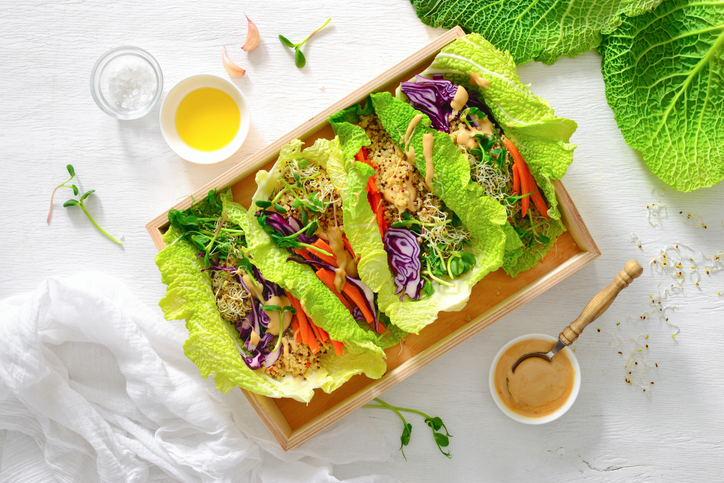Deciphering the Advantages and Challenges of a Raw Food Diet
More people are turning off their stoves and turning to raw foods. There are now raw restaurants, raw cookbooks and cooking classes. But there is still some confusion about raw food diets, and more research is needed to substantiate some of the claims for and against them.
Some define the raw food diet as eating 100 percent raw foods and following a vegan diet, which excludes dairy, eggs, poultry, meat and honey. Other people believe that eating 70 or 50 percent raw foods is fine, and some individuals who eat raw may include raw dairy, fish, meat and eggs.
Eating raw foods has many advantages, and some experts heartily endorse raw diets, as long as you do not eat 100 percent raw: Most people would not have the time for food preparation commitment. Raw food enthusiasts claim that eating raw foods improves health and may reduce the risk of certain diseases. Jane Wilson, a nurse and registered dietitian in Richmond, agrees.
Over the years, evidence has shown that vegetarian diets are safe and healthy. “In fact, it is the position of the American Dietetic Association (ADA) and Dietitians of Canada that ‘appropriately planned vegetarian diets, including vegan diets are healthful, nutritionally adequate, and provide health benefits in the prevention and treatment of certain diseases,’” Wilson says. She believes that fibromyalgia, cancer, cardiovascular disease, diabetes, rheumatoid arthritis and overweight/obesity are conditions that may improve by eating a raw vegan diet, but more definitive research is needed.
119°F — Most raw food enthusiasts believe that food should be cooked no higher than this, because cooking destroys the natural enzymes in food that aid with digestion and can improve health
Dr. Scott D. Banks, who provides clinical nutritional therapy at Banks Nutrition Center, concurs that there are health benefits to eating raw foods. “A good raw food diet can have a dramatic beneficial effect on problems such as pre-diabetes or diabetes,” he writes in an e-mail to The Health Journal. He mentions that this needs to be monitored, because “the improvement in blood sugar can be so fast that they become ‘over-medicated’ and hypoglycemic.” By monitoring these individuals more frequently, reducing their medications may become possible.
Julie Mitchell, nutritionist and certified homeopathic doctor at the Nutrition & Wellness Center, says there is energy to raw foods. “You’re bringing this fuel source that has higher energy than chemicals. Things will heal that weren’t healing,” she says. Mitchell advises eating certified organic foods that do not contain poisons and the byproducts of pesticides, hormones, antibiotics and such.
Mitchell says the raw food diet needs to fit the individual. “If you’re a vegetarian, you need to get enough protein so that there is no tissue breakdown,” she says. “Half of your diet should come from raw foods, nuts and sprouts.” Wilson recommends that those on a raw vegan diet should add a vitamin B12 supplement to prevent a deficiency. She also encourages adding ground flax and walnuts to provide plant sources of omega 3 fatty acids and adding a vitamin D supplement to “provide maximum protection against cardiovascular disease and improve bone health.”
Banks says that, provided the food is of good quality, there do not appear to be additional benefits from eating greater than 50 percent of the diet raw. “Since a raw food diet tends to be dominant in plant food,” he writes, “people should take care to get enough protein. They can do that by eating beans and adding a raw fruit or vegetable shake with protein powder (pea, hemp, soy, etc.).” How much protein do people need? Wilson says the ADA recommends the same intake of protein regardless of the source: 0.028 oz. per 2.2 lbs. of weight.
Most raw food diet enthusiasts believe that food should be cooked no higher than 119 degrees Fahrenheit, because cooking destroys the natural enzymes in food that aid with digestion and can improve health. Experts have differing opinions, however. Mitchell says it’s important to lightly sauté foods, a process which leaves the enzymes. “As people age, they need enzymes. Belching, gas and food in bowel movements are signs [of that].”
But Wilson disagrees that cooking destroys enzymes. She explains that when food is eaten, the hydrochloric acid in the stomach destroys the enzymes, and our bodies then produce enzymes to digest carbohydrates, protein and fat. She poses the question: “Do the plant enzymes in the raw plant food eaten really improve digestion and health?” Wilson does acknowledge, however, that eating a raw vegan diet can help improve a person’s diet because such things as dietary cholesterol are not in the diet and refined carbohydrates are greatly, if not entirely, reduced.
Food regulators have expressed concern that cooking meat at such low temperatures can lead to food poisoning. To the contrary, Banks explains that low temperature cooking is adequate from good, naturally produced animal protein. He cautions that undercooking meat can be an issue when consuming meat from antibiotic and grain-fed cattle, because they develop bacterial strains more adept at surviving in the human digestive tract. Consuming undercooked chicken can lead to Salmonella or Campylobacter poisoning and is not recommended. Trichinosis is a food-borne disease caused by eating raw or undercooked pork that could be tainted with the worm larvae of trichinella spiralis. Our stomach, however, kills most of the bacteria we will be exposed to through food in a natural diet.
Eating raw foods is at least worth a shot, experts say. As Banks writes, “Even a one-month raw food diet each year is a big plus. Doing the homework to try it generally leads to knowledge that leads to longer-term changes. Involving children in this process is a great learning experience.”
Originally published April 2, 2012.
Updated April 10, 2019


